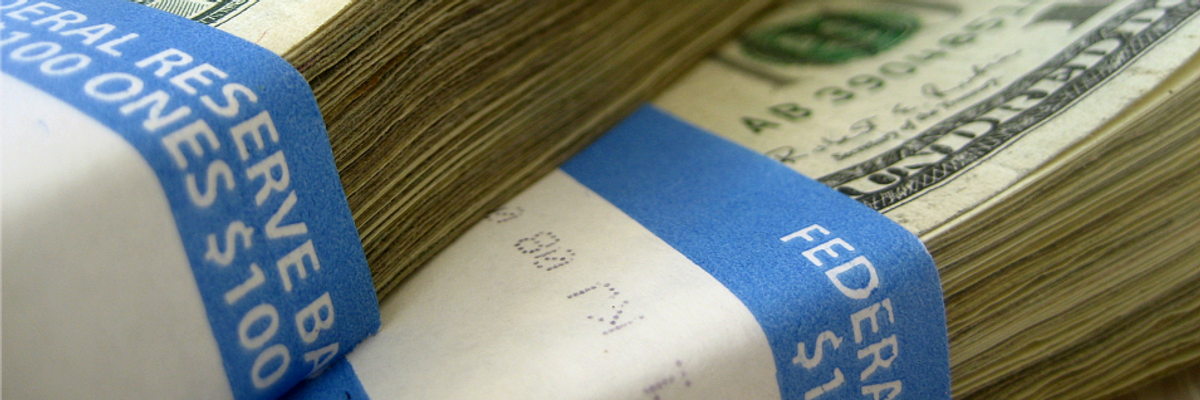
Support for a Universal Basic Income is on the rise, as Americans' anxiety over automation in the workforce intensifies. (Photo: 401(K) 2012/Flickr/cc)
As Automation Concerns Grow, Support for Universal Basic Income Soars
"We don't need to threaten people with homelessness and poverty to get them to work. It's capitalism where income doesn't start at zero."
Americans have become far more receptive to the idea of a Universal Basic Income (UBI) in recent years--with many saying that the potential rise of automation in business is a top reason that the government should ensure all Americans are guaranteed an income.
A poll by Northeastern University/Gallup finds that 48 percent of Americans are now in favor of the government sending regular checks to every citizen to supplement whatever other income they have, in light of new evidence that robots could take over millions of jobs in the coming years. The survey, in which 3,000 people were polled, represents a shift in the past decade, according to Georgetown University professor Karl Widerquist, a political economist and UBI advocate.
"It represents an enormous increase in support" for UBI, Widerquist told CNBC. "It's really promising."
Widerquist points out that polls taken just a decade ago found much more narrow support for the concept, with only about 12 percent of Americans backing UBI.
A survey taken by the Huffington Post just four years ago found that only 35 percent of respondents supported UBI, including just 40 percent of people under the age of 30.
A report released last November by McKinsey & Company found that as many as 800 million workers could be replaced by robots, and anxiety about automation appeared to influence the results of the Northeastern/Gallup poll.
About three-quarters of those polled said they expect automation to take away more jobs than it generates, and more than half were concerned that they would not be able to find a new job should they be replaced at work.
Eighty percent of those surveyed said that companies that benefit from automation should pay higher taxes in order to help fund a UBI for all Americans.
UBI programs in cities and states have taken off recently, with Stockton, California announcing it would study the impact of a basic income by giving $500 to dozens of the city's low-income families. Residents of Alaska have benefited from the Alaska Permanent Fund since 1980; most who have lived in the state for at least a year are entitled to an annual payout of around $2,000.
Both Canada and Finland have introduced pilot programs, providing a UBI to some unemployed people and those making under $26,000 per year. Just five months into Finland's experiment last year, recipients reported decreased levels of stress and greater incentive to find work.
"We don't need to threaten people with homelessness and poverty to get them to work," Widerquist told CNBC. "It's capitalism where income doesn't start at zero."
An Urgent Message From Our Co-Founder
Dear Common Dreams reader, The U.S. is on a fast track to authoritarianism like nothing I've ever seen. Meanwhile, corporate news outlets are utterly capitulating to Trump, twisting their coverage to avoid drawing his ire while lining up to stuff cash in his pockets. That's why I believe that Common Dreams is doing the best and most consequential reporting that we've ever done. Our small but mighty team is a progressive reporting powerhouse, covering the news every day that the corporate media never will. Our mission has always been simple: To inform. To inspire. And to ignite change for the common good. Now here's the key piece that I want all our readers to understand: None of this would be possible without your financial support. That's not just some fundraising cliche. It's the absolute and literal truth. We don't accept corporate advertising and never will. We don't have a paywall because we don't think people should be blocked from critical news based on their ability to pay. Everything we do is funded by the donations of readers like you. Will you donate now to help power the nonprofit, independent reporting of Common Dreams? Thank you for being a vital member of our community. Together, we can keep independent journalism alive when it’s needed most. - Craig Brown, Co-founder |
Americans have become far more receptive to the idea of a Universal Basic Income (UBI) in recent years--with many saying that the potential rise of automation in business is a top reason that the government should ensure all Americans are guaranteed an income.
A poll by Northeastern University/Gallup finds that 48 percent of Americans are now in favor of the government sending regular checks to every citizen to supplement whatever other income they have, in light of new evidence that robots could take over millions of jobs in the coming years. The survey, in which 3,000 people were polled, represents a shift in the past decade, according to Georgetown University professor Karl Widerquist, a political economist and UBI advocate.
"It represents an enormous increase in support" for UBI, Widerquist told CNBC. "It's really promising."
Widerquist points out that polls taken just a decade ago found much more narrow support for the concept, with only about 12 percent of Americans backing UBI.
A survey taken by the Huffington Post just four years ago found that only 35 percent of respondents supported UBI, including just 40 percent of people under the age of 30.
A report released last November by McKinsey & Company found that as many as 800 million workers could be replaced by robots, and anxiety about automation appeared to influence the results of the Northeastern/Gallup poll.
About three-quarters of those polled said they expect automation to take away more jobs than it generates, and more than half were concerned that they would not be able to find a new job should they be replaced at work.
Eighty percent of those surveyed said that companies that benefit from automation should pay higher taxes in order to help fund a UBI for all Americans.
UBI programs in cities and states have taken off recently, with Stockton, California announcing it would study the impact of a basic income by giving $500 to dozens of the city's low-income families. Residents of Alaska have benefited from the Alaska Permanent Fund since 1980; most who have lived in the state for at least a year are entitled to an annual payout of around $2,000.
Both Canada and Finland have introduced pilot programs, providing a UBI to some unemployed people and those making under $26,000 per year. Just five months into Finland's experiment last year, recipients reported decreased levels of stress and greater incentive to find work.
"We don't need to threaten people with homelessness and poverty to get them to work," Widerquist told CNBC. "It's capitalism where income doesn't start at zero."
Americans have become far more receptive to the idea of a Universal Basic Income (UBI) in recent years--with many saying that the potential rise of automation in business is a top reason that the government should ensure all Americans are guaranteed an income.
A poll by Northeastern University/Gallup finds that 48 percent of Americans are now in favor of the government sending regular checks to every citizen to supplement whatever other income they have, in light of new evidence that robots could take over millions of jobs in the coming years. The survey, in which 3,000 people were polled, represents a shift in the past decade, according to Georgetown University professor Karl Widerquist, a political economist and UBI advocate.
"It represents an enormous increase in support" for UBI, Widerquist told CNBC. "It's really promising."
Widerquist points out that polls taken just a decade ago found much more narrow support for the concept, with only about 12 percent of Americans backing UBI.
A survey taken by the Huffington Post just four years ago found that only 35 percent of respondents supported UBI, including just 40 percent of people under the age of 30.
A report released last November by McKinsey & Company found that as many as 800 million workers could be replaced by robots, and anxiety about automation appeared to influence the results of the Northeastern/Gallup poll.
About three-quarters of those polled said they expect automation to take away more jobs than it generates, and more than half were concerned that they would not be able to find a new job should they be replaced at work.
Eighty percent of those surveyed said that companies that benefit from automation should pay higher taxes in order to help fund a UBI for all Americans.
UBI programs in cities and states have taken off recently, with Stockton, California announcing it would study the impact of a basic income by giving $500 to dozens of the city's low-income families. Residents of Alaska have benefited from the Alaska Permanent Fund since 1980; most who have lived in the state for at least a year are entitled to an annual payout of around $2,000.
Both Canada and Finland have introduced pilot programs, providing a UBI to some unemployed people and those making under $26,000 per year. Just five months into Finland's experiment last year, recipients reported decreased levels of stress and greater incentive to find work.
"We don't need to threaten people with homelessness and poverty to get them to work," Widerquist told CNBC. "It's capitalism where income doesn't start at zero."

